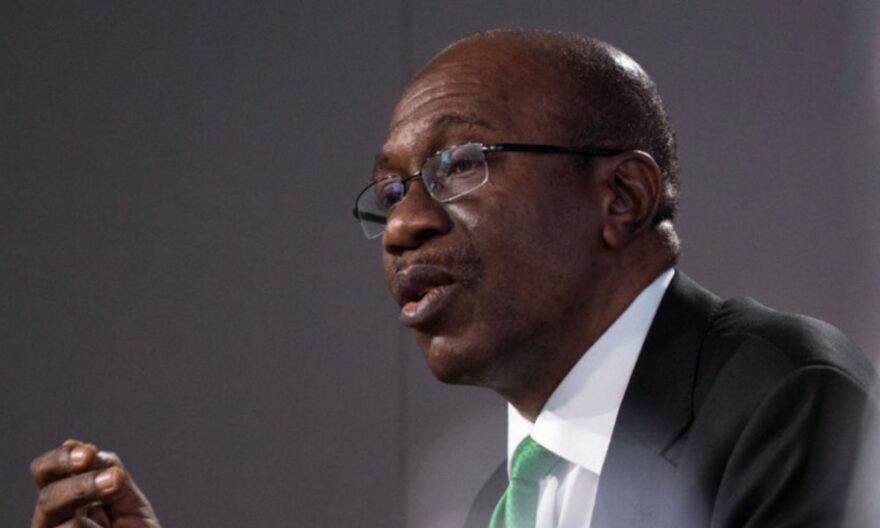
The Governor, Central Bank of Nigeria, Mr Godwin Emefiele, said on Tuesday that over N300bn had been disbursed to companies operating in southern part of Nigeria as part of its interventions in the agricultural sector.
JOIN US FOR MORE ON:
or
or Follow us on WhatsApp Channel
Emefiele said this while faulting claims in certain quarters suggesting that the bank’s targeted interventions in the sector were tilted in favour of a certain section of the country.
He said companies and farmers across Lagos, Edo, Ondo, Ogun, Osun, Ekiti, Bayelsa, Rivers, Cross River states were major beneficiaries of the bank’s interventions.
Emefiele made the clarification in Ado-Ekiti, Ekiti State, while unveiling the 2020 wet season harvest aggregation and inauguration of the 2021 wet season input distribution in the South-West geopolitical zone under the CBN-RIFAN Anchor Borrowers’ Programme.
Read Also
- CBN Agricultural Loan 2021 – How to Apply Online
- AFEX raises $50 million to Finance SMEs in Nigeria’s Agric Sector
- CBN Unveils Private Sector-led Agriculture Devt Scheme
- CBN To Give 120,000 Maize Farmers Loan Under The CBN’s Anchor Borrowers Programme
According to him, contrary to views held by some individuals and interest groups, the bank’s interventions in the Anchor Borrowers’ Programme were not only about rice production but had expanded to over 21 crops and were evenly spread across the country.
He described criticisms against the bank’s effort at boosting agriculture in the country as unfair.
Emefiele urged stakeholders in the various crop value chains to continually make consistent and positive strides towards attaining food security, saying attaining self-sufficiency in food production would not come cheap.
While acknowledging the current challenges in attaining food security in Nigeria, he said synergy among stakeholders would surely catalyse the growth process.
He said the CBN stood ready to offer effective partnership to deliver on this critical national mandate of attaining self-sufficiency in food production.
According to him, the sustainability of Nigeria’s current efforts in agricultural production can only be guaranteed if youths are attracted into agriculture as they remain the future of the country.
He therefore enjoined Nigerian youths to embrace agriculture, saying, “They have the talent, energy, enthusiasm, technological adoption capacity and all the right drive to revolutionise agricultural production in Nigeria.
“We must meet them half-way to ensure that we provide the enabling environment to make agriculture attractive to them. The Central Bank of Nigeria stands ready to support youths that are willing to engage in agriculture.”
The CBN governor disclosed that a total of 3,107,890 farmers had been financed for the cultivation of 3,801,397 hectares across 21 commodities through 23 participating financial institutions in the 36 states and the Federal Capital Territory.
He added that under the 2020 wet season CBN-RIFAN partnership, the bank had also financed 221,450 farmers for the cultivation of 221,450 hectares in 32 states.
Emefiele said the bank planned a minimum one million hectares of rice through a combination of RIFAN farmers and prime/private anchors for each planting season in 2021.
He restated the bank’s resolve to partner with the fiscal authorities to ensure the integration of Nigerian farmers into the government’s Economic Sustainability Programme aimed at providing five million homes with electricity using solar energy.
He also urged farmers to repay their loans in order to sustain the ABP.
He said every farmer with a good repayment record in the programme would be eligible to get a solar home system that would provide electricity to power their essential home appliances.
Emefiele said the bank would develop a repayment framework that would allow farmers to use their farm produce as repayment for the electricity consumed by the beneficiaries of the scheme.
“Loan repayment is the hallmark of every credit cycle and the sustainability of the programme is hinged on farmers’ ability and willingness to repay their loans, and we are constantly engaging with them to enhance their trust in the system,” he added.
Source: Punch.
